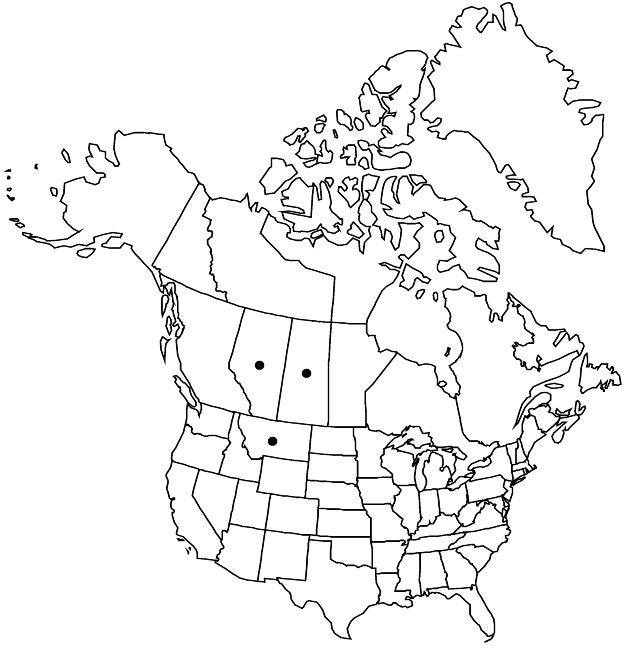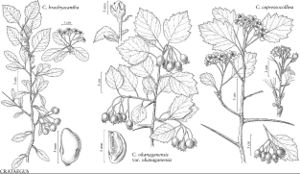Crataegus cupressocollina
J. Bot. Res. Inst. Texas 1: 1056, plates 6.2a, 7a,b, fig. 6. 2007.
Shrubs or trees, ± erect, 25–60 dm. Stems: twigs: new growth greenish red young, sparsely pilose, 1-year old deep to reddish-brown, shiny, older orangebrown overlaid with gray; bark on 2–5 cm thick branches orangebrown; thorns on twigs few to numerous, ± straight to strongly recurved, slender, 3–7 cm, 2-years old blackish brown. Leaves: petiole 1–2 cm, sparsely hairy young, sparsely glandular; blade ± ovate to broadly elliptic, 3–6 cm, thin, base broadly cuneate, lobes 3 or 4 per side, max LII ca. 15%, lobe apex acute to ± rounded, margins serrate, teeth numerous, small, gland-tipped when young, veins 3 or 4 per side, apex acute, shiny, abaxial surface glabrate, some axils of midvein pilose, adaxial appressed-hairy. Inflorescences 5–15-flowered; branches sparsely to moderately or densely pilose; bracteoles pale brownish, margins nearly eglandular, minutely short, delicately stipulate-glandular. Flowers 15–18 mm diam.; hypanthium glabrous; sepals ± anthocyanic, triangular, length not recorded, margins finely glandular-serrate, abaxially glabrous, adaxially pilose; stamens 10, anthers white; styles 3–5. Pomes on pendulous branches, burgundy (Aug–early Sep), black (late Sep), glossy, ellipsoid, 7–10 mm diam., glabrous; sepals spreading, wide, 3–4 mm, apex ± acuminate; pyrenes 3–5, sides ± irregularly pitted or scarred.
Phenology: Flowering late May–early Jun; fruiting Aug–Sep.
Habitat: Thickets, grasslands, light shade of Populus spp.
Elevation: 800–1200 m
Distribution

Alta., Sask., Mont.
Discussion
Crataegus cupressocollina is found through much of the Cypress Hills, where it may be common, and in a restricted area in the Bear's Paw Mountains, Montana. The species is distinctive in its tall, willowy, upright habit, leaf form, relatively long, slender thorns, and two to five year-old orange-brown bark. The flowers differ from those in ser. Douglasianae in their white anthers. The ripe fruit of C. cupressocollina is glabrous and plum red to purple-brown in late August, after which it ripens to a glossy purple-black. The large, pendulous clusters of fruit at once draw attention, as do the reddish tips of the sepals and the soft red-brown of the often nearly eglandular bracteoles when in flower. The colorful expanding bud scales are also rather striking. Crataegus cupressocollina is the first to flower of sympatric species.
Selected References
None.
Lower Taxa
"thin" is not a number."thick" is not a number."glandular-serrate" is not a number."wide" is not a number."adnate" is not a number."dm" is not declared as a valid unit of measurement for this property.
